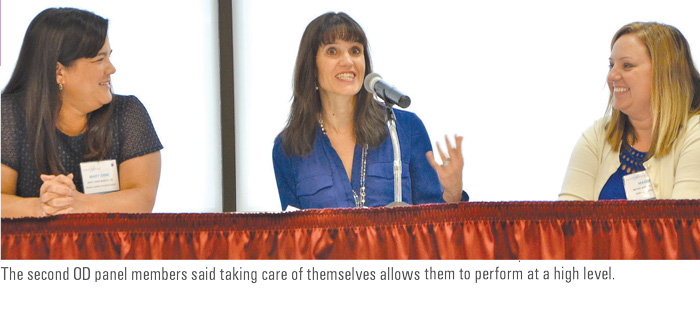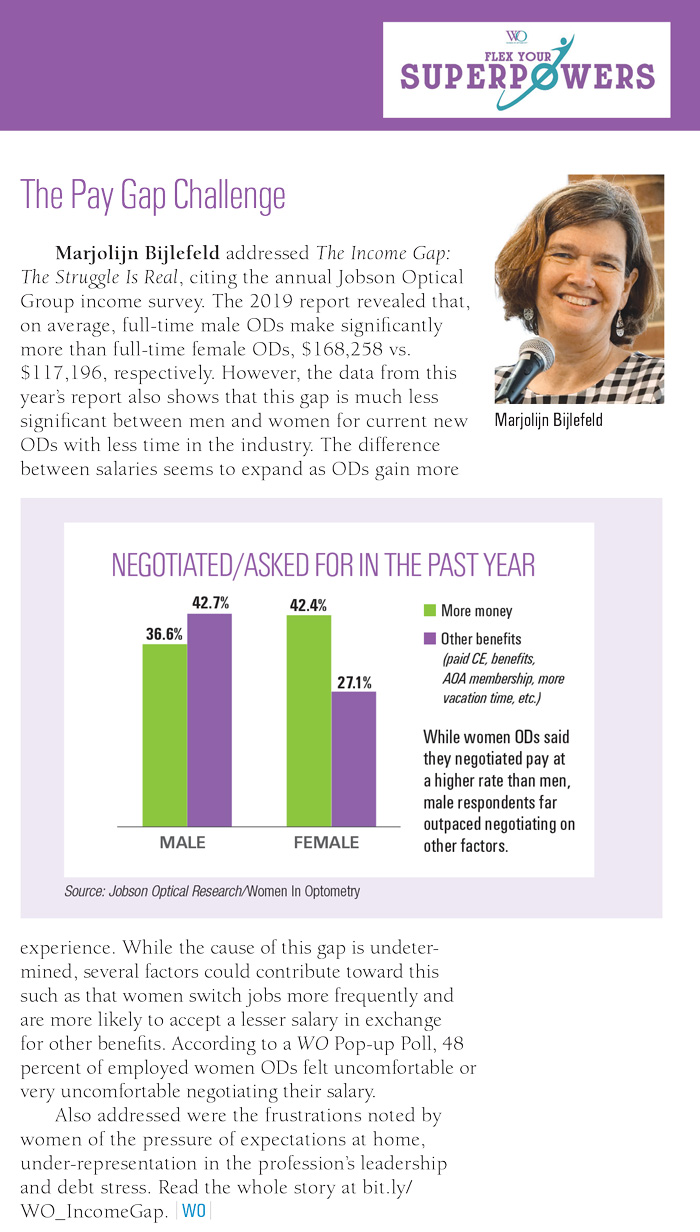

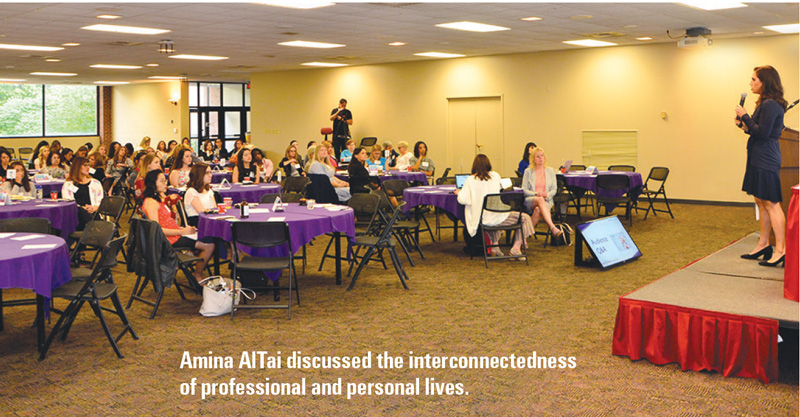

The first female president of the American Optometric Association, Dori Carlson, OD, FAAO, greeted attendees to the first annual Women In Optometry (WO) leadership conference at host University of Missouri, St. Louis, College of Optometry. In her presentation, You Are the 20 Percent, Dr. Carlson, who owns two private practices in North Dakota and is pursuing a master’s in leadership, defined leadership as influence. “We all have the ability to be leaders,” Dr. Carlson said, through interactions with patients—young and old—as well as students. She said further developing a leadership philosophy requires personal growth and creating and cultivating the skills within us.
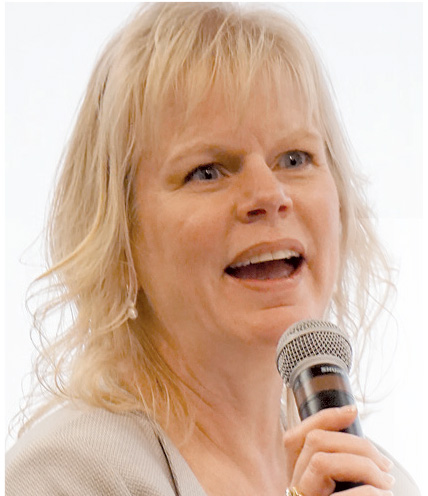

Dr. Carlson praised attendees of the summit who self-selected to take a step forward with their own leadership initiatives. The 80/20 rule, also known as Pareto Principle, suggests that 20 percent of activities account for 80 percent of results, and Dr. Carlson said that the principle applies to people as well as results-oriented activities. In order to keep from spending time on nonproductive tasks, she recommended that attendees look at their to-do lists and tackle the top two of 10 items personally, and then take the leadership step of delegating the remaining tasks. “You have the ability to change the world because you are the 20 percent.”
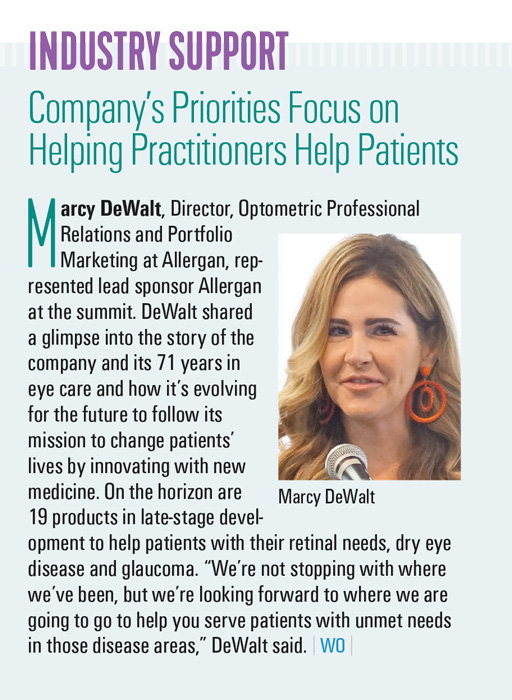

Let Your Work Lift You Up
Keynote speaker Amina AlTai first took the stage to talk about living your best professional life. AlTai is a holistic business and mindset coach who shares her own story of her career, which started in marketing at Cartier. Corporate America wasn’t her best fit, so she left to form her own agency that would specialize in working with entrepreneurs. But after several years, she was burned out both mentally and physically and facing some catastrophic health risks.
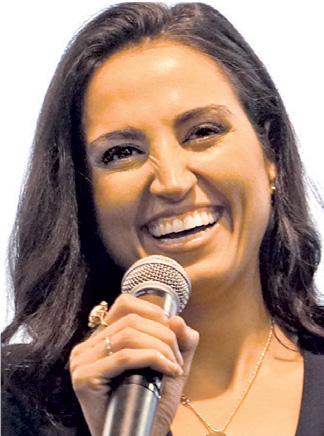

AlTai addressed how blocks in our mindset can keep us from success. She detailed how she needed to change her relationship with work and stress to heal herself physically as well as adjust how she determined her self-worth, noting that the mind, body and career approach are all intrinsically tied.
AlTai has redefined her view of success, sharing that authenticity matters more than a nonstop hustle to her now. She asked the audience to consider several factors in their own journey to realignment including their gifts, what brings them joy, what they value, what they impact and what they do. For example, when assessing one’s gifts, she advised that people should look not where they are practiced and polished, but at areas where innate abilities pour through without much effort.
Focus on less force and more flow. What do you need to feel good in your work? Is it stronger boundaries or more support? Is it more money? Take the time to analyze these areas regularly, as they change and evolve. “Let your work lift you up,” she said.
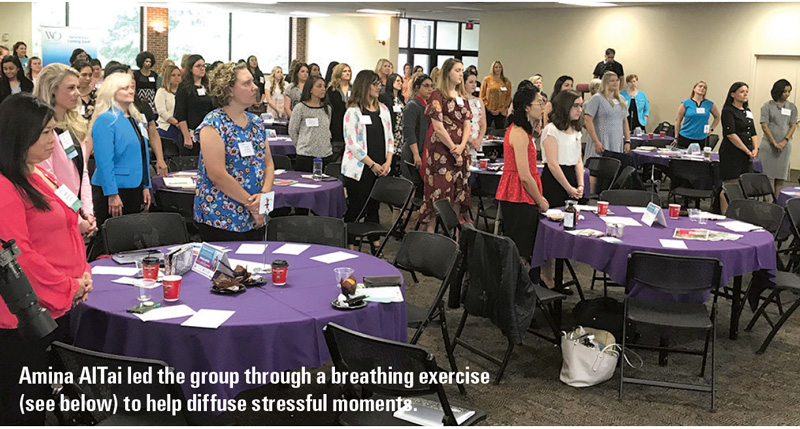

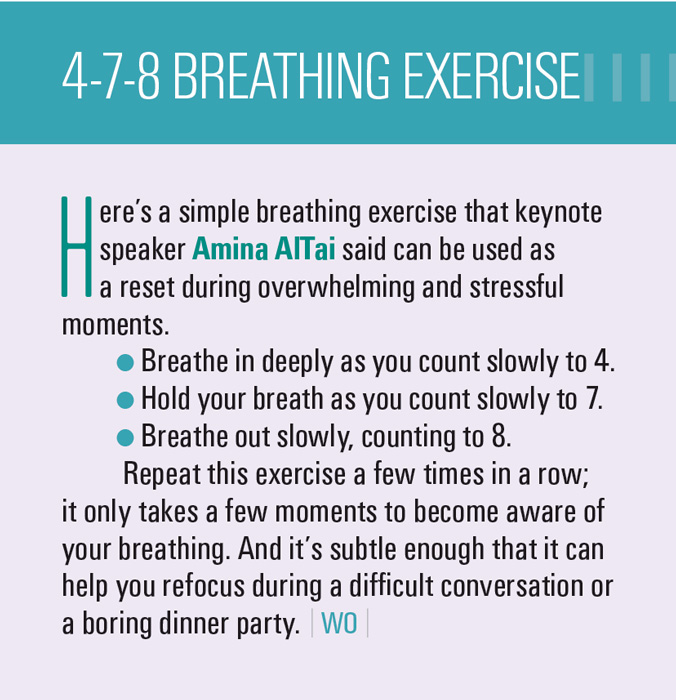

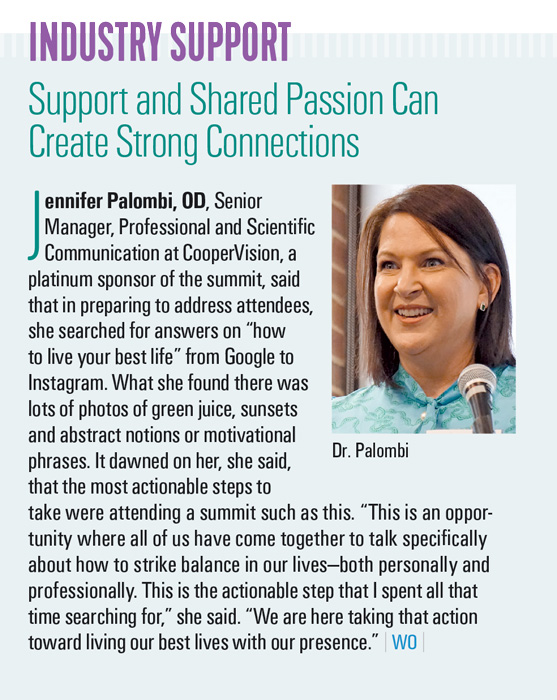

Professional Goals May Shift During Career
The Living Your Best Professional Life panel was moderated by Dr. Carlson, who was joined in the discussion by Mamie Chan, OD, former president of the New Mexico Optometric Association and leader in a number of other local and national organizations; Sherrol Reynolds, OD, FAAO, president of the National Optometric Association; and Rachael Wruble, OD, FAAO, vice president of the North Carolina Optometric Society and the recipient of the 2018 Young OD Theia Award from Women In Optometry.
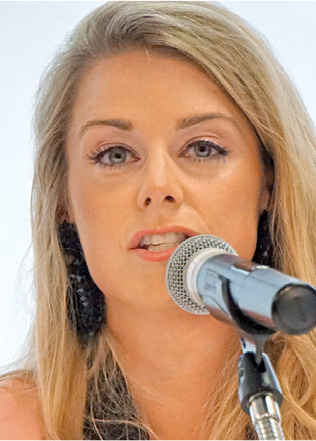

Dr. Wruble has found her best professional life by making sure she’s happy in her work every day. Dr. Wruble struck out on her own after working in an office that experienced a transfer of ownership. Having more influence was important to her, and she’s now an owner of two practices, where she said that she’s rediscovered the joy in her work. “It’s not about just seeing patients. How can I help them see in a different way that may be new?” Dr. Wruble works toward this goal by continuing her education on new technologies and techniques.
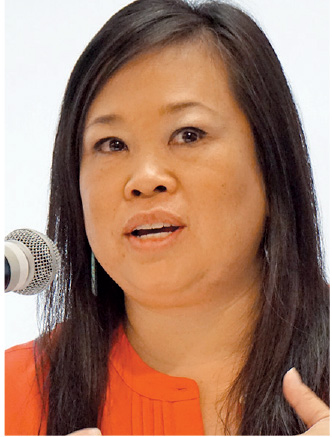

Balance in your professional life is likely to evolve over the course of your life and career, Dr. Chan said. She grew up in the optometry practice of her father, Tony Chan, OD, watching him advocate for the profession, most notably fight on the state floor in New Mexico for the right to dilate in the 1980s. Early in her career, she had many big aspirations of taking over the Albuquerque area with multiple offices, which led to a partnership with her cousin on three practices. Yet she stepped away after eight years, feeling spread too thin. Now Dr. Chan says that her best professional life looks different: one office and more control so that she can spend more time attending school functions for her two children, ages 8 and 10. She added that she expects it will continue to evolve again in the next few years as her children get older.
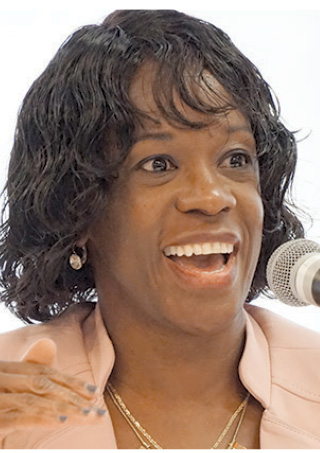

Mentorship played a key role along Dr. Reynolds’ journey to leadership in the profession. She says that she met the late Terrance N. Ingraham, OD, when he was president of the National Optometric Association. His guidance and an introduction to his network paved the way to joining committees and becoming more involved in the organization. It inspired Dr. Reynolds to pay it forward as she moved through her career, mentors OD students and speaks at different college events. She also has mentored female high school students through the local program Women of Tomorrow for the past 10 years. She hopes that introducing them to the profession and showing her passion for it will inspire them. “They realize that they, too, can be empowered to speak up, take bold steps and to choose a profession they are passionate about.”
Personal and Professional Satisfaction Are Intertwined
Keynote speaker Amina AlTai returned to the stage to address how her diagnosis with two autoimmune diseases and her crash and burn with work had depleted her personal life and how living a best personal life is intrinsically tied to living a best professional life. She shared a quote from Casandra Brené Brown, PhD, MSW, research professor at the University of Houston, that resonated with her: “Believing that you’re enough is what gives you the courage to be authentic, vulnerable and imperfect.” Beliefs are cemented during early, formative years and are shaped and formed as people are imprinted by other’s ideas about the world, she said. Those beliefs drive a person’s thoughts and actions when it comes to money, work, love and more. AlTai stressed that it’s important to hold up these beliefs to the light every now and then to see if they still serve as motivation or if it’s time to adjust.
She retold a story from a client, who had developed a core belief that she hurt others when she was being her true, unabashed self at the age of 4. Carrying that belief throughout her life led to strain at work as she fit herself into roles that weren’t quite right and at home by disconnecting from her partner and binging on wine and candy because she felt she couldn’t be herself. “When we don’t feel like we can be ourselves or when we are living in a story, it impacts all the different areas of our lives,” AlTai said. “Our conscious brain processes about two percent of information and memories and the majority of the rest is woven in our subconscious, affecting different parts of our lives that we believe are fate but are really directed by mechanics of the subconscious.”
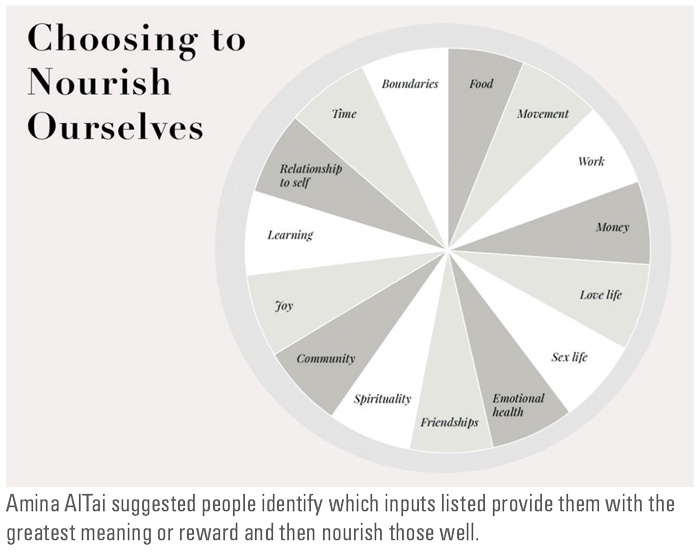

AlTai said that she sees nourishment as a conduit to clarity. There are many different inputs in life—work, money, love life, sex life, emotional health, food, movement, spirituality, community, joy, learning, relationship to self, time and boundaries that together make a person feel whole and nourished. Each individual has his or her own code for creating balance, and when that coding is off, it can wreak havoc on relationships.
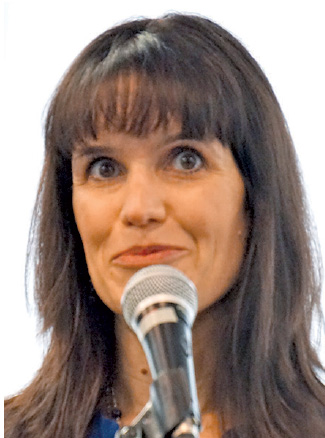

Melissa Barnett, OD, FAAO, FSLS, clinician, specialty lens expert, lecturer, mentor and advocate for women in the profession, moderated the conversation Living Your Best Professional Life. On the panel were Maria Sampalis, OD, who launched the 25,000-member strong Corporate Optometry group on Facebook, and Mary Anne Murphy, OD, who owns a successful Colorado practice and encourages her associates and staff to be active participants in the community, their families and organizations that are important to them.
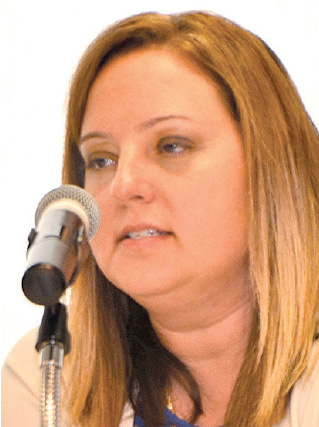

Dr. Sampalis said she sees balance in her personal life as a synergy; her patients have developed an understanding that her family and children are part of her businesses. She says that having her own business has allowed her to establish this culture and that creating a network of professional and personal support for corporate-affiliated ODs drove her interest in launching the online communities.
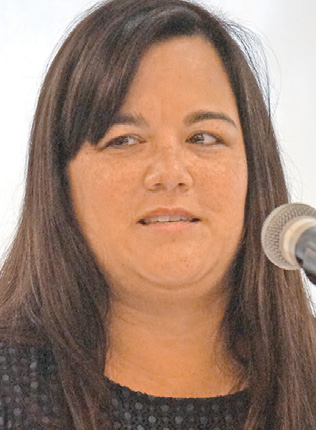

Dr. Murphy describes how her own view of “balance” has evolved. At one point, she felt that balance meant that all parts must be equal and steady. An avid angler, she adjusted her view after fly-fishing with her dog—in a canoe. Sometimes the boat tilts one way and then the other. The dog shifts position, bringing another unanticipated upset into the balance—but she realized she could keep the canoe from tipping by compensating. “Sometimes I’m more of a mom, sometimes I’m more of a doctor, sometimes I’m more of a board member, but I’m staying afloat.” Each commitment is made with careful consideration as to how it will fit in with all the elements of her life.
